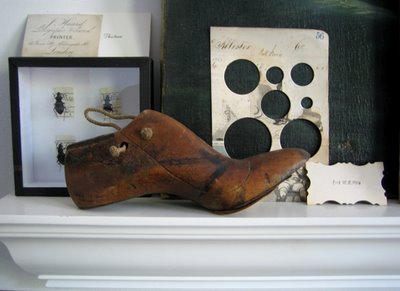
I just now looked up “the tyranny of things”, a somewhat overwrought but appealing phrase that I had seen somewhere a few years ago and filed away. According to Bill Brown, a professor at University of Chicago and co-editor of Critical Inquiry, it was the title of an anonymous essay that appeared in the May, 1906, Atlantic Monthly. The author lamented that,
I don't have specific collections (although for a while I collected ticket stubs) I just tend to acquire things. The common attributes being “old” and I suppose “odd.” Those two traits often amount to "worn", "rusted", "weathered", by default if not actually by choice. Paper ephemera and postcards, wooden objects, shells, green pottery, odd pieces of metal, naive paintings, hotel silver, flea market photos, letters/signs/numbers– I have been oppressed by this “tyranny” for a while now and I'm ambivalent about it. I love each thing, but am oppressed by things. Some collectible, most just collected.we make 'collections,' we fill our rooms, our walls, our tables, our desks, with things, things, things.
Virtually none of this stuff is personal memorabilia. In a (somewhat windy) essay I found randomly, the Dutch artist Tjebbe van Tijen discusses personally meaningful objects:
I feel that is true of my stuff, too, that somehow they hold stories I would not otherwise "see." Of course I also have, and acquire, things for "purely" aesthetic value, but I think that is ultimately a component of their "stories." By way of explanation of this sense that these things possess stories is the peculiar and poignant Japanese tradition of Harikuyo:There is a story with each of such objects, in most cases the story is not visible, the object does not depict a particular event, the event needs to be told. Language to make "the invisible visible" says Krzysztof Pomian in his study on the 'Origin of the museum' ... objects that have changed their status, from an object with use value to an object representing what can not be seen.
the Festival of Broken Needles. Harikuyo is a solemn rite of respect and thanksgiving [held on February 8] in which the worn and broken sewing needles used in the previous year are retired to a sacred resting place.Quite different in its particular but similar in essence.
I began this post yesterday and it's a very odd coincidence that today's Times has a small article about a web site called zebo where members list and post their everyday possessions (as well as "wants"). The site's tagline is “Hi. What do you own?” Fascinating. I'd love it* if it wasn't so disturbing. This is where a discussion ensues on the nature of escalating consumption as illusory respite from psychic emptiness and its relation to the current state of American society...
-----
*I once had an idea for a 'conceptual art piece' where I would label every possession I own (mostly I was thinking of those of the "collectible" variety) with museum-like captions and provenance: what era the item is likely from, what it once was, why "important", where I purchased, what I paid.




3 comments:
Fascinating ideas about objects and the power that we invest in them. It picks up on thoughts I have been pondering about objects that I photograph, objects found in junk shops and antiques dealers, or in my case, things that I find in abandoned buildings. These objects, while fascinating, and sometimes beautiful, can often be fairly mute about their particular past, their hidden histories. We are left to fill in the blank spaces with an imagined past, create fictional stories and meditations based perhaps on a scuff or wear mark. So perhaps it is the history that we will never know about that is intriguing about these orphaned things.
I was just reading a terrific book, "The Past is a Foreign Country" by David Lowenthal (NOT the one mentioned in my earlier post of that name). He says:
[pondering/admiring] ruins long remained evocative, and traces of that taste survive in modern fondness for the fragmentary, the indistinct and the suggestively incomplete.
Just as you say, "the history we will never know" is the intriguing thing.
hmmmm its a great hobby to collect antique things. i often search for motormint discount code to save on unique & antique items.
Post a Comment